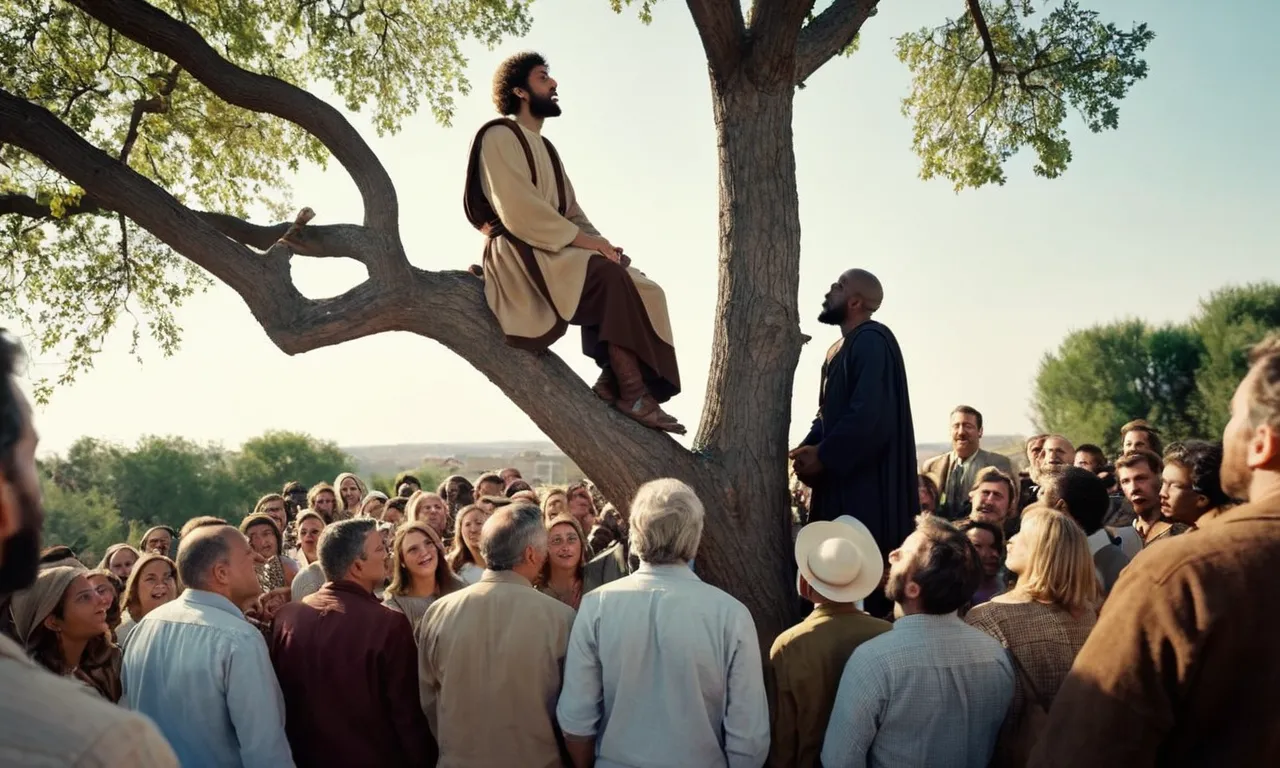Why Did Zacchaeus Want To See Jesus?
If you’re wondering why a tax collector like Zacchaeus was so eager to catch a glimpse of Jesus, you’re not alone. This famous story from the Bible has long fascinated readers and inspired many questions.
If you’re short on time, here’s a quick answer to your question: Zacchaeus likely wanted to see Jesus out of curiosity, desperation for salvation, and a deep spiritual longing.
Zacchaeus Was Curious About Jesus
Zacchaeus, as a chief tax collector in Jericho, had likely heard a lot about the famous teacher and miracle worker named Jesus. News of Jesus’ teachings and miraculous deeds had spread throughout the region (Luke 5:15). Zacchaeus must have been curious to evaluate Jesus for himself.
Here are some reasons why Zacchaeus wanted to see Jesus:
Jesus Was Famous for His Teachings and Miracles
By the time Jesus traveled through Jericho, word of his powerful teachings and miracles had spread far and wide. His fame even reached the ears of important public figures like King Herod (Luke 23:8). As a chief tax collector, Zacchaeus interacted regularly with traveling merchants and traders who brought news from distant towns and cities.
He likely heard reports of Jesus’ wisdom, authority, and miracles.
For example, Jesus taught radical ideas like loving one’s enemies (Matthew 5:43-48). He spoke with authority, unlike the teachers of the law (Matthew 7:28-29). He healed the sick, cast out demons, and even raised the dead (Matthew 4:23-24).
As a religious man living in Jericho, these reports must have piqued Zacchaeus’ interest. He probably wondered whether Jesus was a true prophet and longed to hear him teach in person.
Zacchaeus Wanted to Evaluate Jesus for Himself
Even though Zacchaeus was a wealthy, powerful man as the chief tax collector, he still felt a spiritual thirst that his money could not satisfy. Perhaps he sensed a emptiness in his soul and wanted to see if Jesus could fill that need.
According to one tradition, Zacchaeus had heard that the Messiah was coming and wondered if Jesus might be him.
Whatever his reasons, Zacchaeus did not just accept other people’s opinions about Jesus. He wanted to evaluate Jesus for himself. Zacchaeus was not content with second-hand accounts – he had to experience this famous teacher personally.
Being a short man, Zacchaeus even climbed a tree just to get a glimpse of Jesus over the crowds (Luke 19:3-4). His eager efforts showed how much he wanted to hear and see Jesus with his own eyes. Zacchaeus’ curiousity reflects an openness and seeking heart.
Zacchaeus Was Desperate for Salvation
As a Tax Collector, Zacchaeus Was Despised
As a tax collector in first-century Jericho, Zacchaeus would have been absolutely despised by his fellow Jews. Tax collectors worked for the Roman government and were known for charging exorbitant amounts, skimming extra money off the top to line their own pockets.
The Jewish people saw tax collectors as traitors and collaborators with the Roman oppressors. They were grouped together with criminals and prostitutes as the lowest of the low (Matthew 21:31-32). Zacchaeus was a wealthy chief tax collector, so he would have been especially loathed and seen as a social and religious outcast.
Imagine being so scorned and hated by your own community that you were afraid to even approach a traveling rabbi. The crowds’ grumbling in Luke 19:7 reveals just how detestable Zacchaeus was. He must have been desperately lonely and alienated from both his Jewish heritage and his Roman occupation.
Though he was materially rich, his spiritual poverty and isolation drove him to climb a tree just to get a glimpse of Jesus.
Zacchaeus May Have Heard Jesus Could Save Even Him
Word must have already spread through Jericho that Jesus embraced tax collectors and was dining with them (Luke 5:29-32). Luke timidly positions himself in the background when first mentioning his own status as a tax collector (Luke 5:27).
But others boldly approached Jesus, like Levi, who threw a huge banquet for Jesus attended by a huge crowd of his fellow tax collectors. Zacchaeus probably heard that when criticized for eating with sinners, Jesus said he came to call sinners to repentance (Luke 5:32).
After years of being told he was unworthy of love and undeserving of salvation, this message that Jesus offered acceptance even to despised tax collectors must have given Zacchaeus a glimmer of impossible hope.
Though the crowd tried to block him, Zacchaeus was desperate enough to overcome public shame and climb a tree just to see who Jesus was. And sure enough, Jesus looked up at him and invited himself to Zacchaeus’s house to stay.
Imagine Zacchaeus’s shock and awe that despite the crowds’ grumbling, Jesus welcomed him. No supposed “sinner” was beyond the saving grace of God.
Zacchaeus Had a Deep Spiritual Longing
Zacchaeus Likely Felt Empty Inside Despite His Wealth
As a wealthy tax collector, Zacchaeus had accumulated a lot of money and possessions. However, material wealth often does not satisfy the deeper needs of the human soul. It’s likely that despite having tremendous affluence, Zacchaeus felt a gnawing sense of emptiness and longing for meaning in his life.
Several factors may have contributed to Zacchaeus feeling spiritually unfulfilled:
- His wealth was built through dishonest means which violated religious laws – this weighed on his conscience
- He was despised and rejected from Jewish society due to his shady profession
- His lavish lifestyle still left him feeling hollow inside
In the midst of outward success, Zacchaeus yearned for inner peace and purpose. No amount of money could make up for the lack of spiritual wholeness and connection to God that his soul desperately sought.
Seeing Jesus Offered Hope for His Soul
When Zacchaeus heard that Jesus was passing through town, he immediately wanted to get a glimpse of this famous teacher and miracle worker. Having likely heard the wondrous stories surrounding him, Zacchaeus saw Jesus as representing hope for finding the meaning and redemption his soul had been longing for.
Specifically, encountering Jesus gave Zacchaeus hope in several key areas:
- Forgiveness from sin – Jesus was known as a friend of sinners who offered grace and forgiveness
- Acceptance into spiritual community – Jesus did not shun people like the tax collectors
- Life transformation – many people had their lives radically changed after meeting Jesus
For a man who up till then had faced only rejection and judgment from religious society, the welcoming and transformative nature of Jesus’ message offered new light and hope. Meeting Jesus in person thus represented Zacchaeus’ best chance for the redemption and wholeness his soul had been starved of.
Jesus Knew Zacchaeus’ Heart
Jesus Perceived Zacchaeus’ Curiosity from Afar
When Jesus entered Jericho, He looked up and saw Zacchaeus perched in a sycamore tree (Luke 19:1-4). Although the tax collector likely climbed the tree simply to get a better view of Jesus over the crowd, Jesus immediately perceived that Zacchaeus had a deeper motivation.
As the Son of God, Jesus had supernatural insight into people’s hearts and discerned Zacchaeus’ sincere curiosity to know more about Him.
From a distance, Jesus stared right at Zacchaeus as if staring into his soul. He knew the tax collector was not merely a spectator but someone hungering for truth. While others saw Zacchaeus as an outcast or sinner, Jesus saw a seeking heart.
The Lord looks beyond outward appearances and searches people’s inner longings (1 Samuel 16:7). Even before they spoke, Jesus understood Zacchaeus better than the man understood himself.
Calling Zacchaeus by Name Showed Jesus’ Insight
When Jesus called Zacchaeus by name, it powerfully demonstrated His supernatural knowledge of the man’s identity and desires (Luke 19:5). Jesus had never met Zacchaeus before, yet He knew his name. This revealed Jesus’ divine omniscience and underscored that He peered into Zacchaeus’ soul.
By speaking Zacchaeus’ name, Jesus also indicated that He cared about Zacchaeus as an individual. Despite the tax collector’s unpopularity, Jesus did not view him as part of a despised group but as a unique person. The Lord knew Zacchaeus’ story and wanted to meet with him alone.
Using his name conveyed Jesus’ personal interest in the man.
Finally, calling Zacchaeus publically demonstrated Jesus’ authority. It showed that He could summon even an important, wealthy bureaucrat at will. Jesus seized the initiative in the encounter, compelling Zacchaeus to respond to His call.
As God in the flesh, Jesus’ words carried divine power to order events according to His plan.
Zacchaeus Was Transformed After Meeting Jesus
Zacchaeus Became Generous After Encountering Jesus
The story of Zacchaeus provides a powerful example of how encountering Jesus can radically transform someone’s life. According to the Gospel of Luke, Zacchaeus was a wealthy tax collector who was despised by many as a “sinner.”
But when Jesus came to town, Zacchaeus was determined to see him, even climbing a sycamore tree just to get a glimpse of Jesus passing by (Luke 19:1-4). This act reveals Zacchaeus’ eager desire for connection with Jesus.
When Jesus called Zacchaeus down from the tree and invited himself to Zacchaeus’ house, the tax collector welcomed him joyfully (Luke 19:5-6). During this personal encounter, Jesus’ love and acceptance broke through Zacchaeus’ sinful patterns. Zacchaeus stood and declared to Jesus, “Look, Lord!
Here and now I give half of my possessions to the poor, and if I have cheated anybody out of anything, I will pay back four times the amount” (Luke 19:8). This represents a dramatic change in Zacchaeus, from greedy tax extortion to radical generosity.
Jesus’ response shows he recognized this tremendous transformation in Zacchaeus’ life: “Today salvation has come to this house, because this man, too, is a son of Abraham” (Luke 19:9). From this intimate experience of Jesus’ grace and truth flowing into his life, Zacchaeus was freed from greed and corruption and began to bear the fruit of repentance and righteousness.
Jesus Declared Salvation Had Come to Zacchaeus’ House
When Jesus proclaimed “Today salvation has come to this house…” after Zacchaeus’ dramatic change of heart (Luke 19:9), he was making a powerful statement about the transformative power of an encounter with him.
Jesus affirmed that Zacchaeus, despite his past as a tax collector, had received the gift of salvation through welcoming Jesus into his home and life.
This demonstrates that Jesus has power to save even those considered the worst of “sinners.” Though despised by society, when Zacchaeus encountered Jesus with an open and repentant heart, willing to make restitution for past wrongs, he received forgiveness, healing, and belonging in God’s kingdom.
Jesus seems to imply that Zacchaeus and his household would now be included among God’s people, whereas they had formerly been excluded.
This story offers hope that no one is beyond the reach of Christ’s redeeming love. When we humbly seek Jesus, the light of his presence dispels the darkness in our lives, bringing radical renewal. Like Zacchaeus, opening ourselves to Jesus transforms us through God’s grace.
We are saved from sin’s power, liberated to live generously for God’s glory.
Conclusion
In the end, Scripture gives many clues as to why Zacchaeus scrambled up a tree just to catch sight of Jesus passing by. From deep curiosity to spiritual longing to a desperation for salvation, Zacchaeus was clearly drawn to Jesus in a profound way.
When Jesus called him down and invited himself over, Zacchaeus’ life was forever changed. This moving Bible story continues to remind us that no one is beyond the saving power of Christ’s transformational love.








